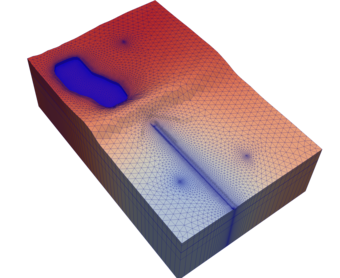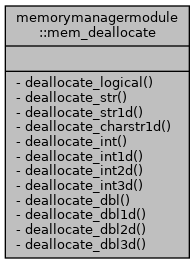|
| subroutine | deallocate_logical (sclr) |
| | DEPRECATED. The memory manager will handle the deallocation of the pointer. More...
|
| |
| subroutine | deallocate_str (sclr, name, mem_path) |
| | DEPRECATED. The memory manager will handle the deallocation of the pointer. More...
|
| |
| subroutine | deallocate_str1d (astr1d, name, mem_path) |
| | Deallocate an array of defined-length character strings. More...
|
| |
| subroutine | deallocate_charstr1d (astr1d, name, mem_path) |
| | DEPRECATED. The memory manager will handle the deallocation of the pointer. More...
|
| |
| subroutine | deallocate_int (sclr) |
| | DEPRECATED. The memory manager will handle the deallocation of the pointer. More...
|
| |
| subroutine | deallocate_int1d (aint, name, mem_path) |
| | DEPRECATED. The memory manager will handle the deallocation of the pointer. More...
|
| |
| subroutine | deallocate_int2d (aint, name, mem_path) |
| | DEPRECATED. The memory manager will handle the deallocation of the pointer. More...
|
| |
| subroutine | deallocate_int3d (aint, name, mem_path) |
| | DEPRECATED. The memory manager will handle the deallocation of the pointer. More...
|
| |
| subroutine | deallocate_dbl (sclr) |
| | DEPRECATED. The memory manager will handle the deallocation of the pointer. More...
|
| |
| subroutine | deallocate_dbl1d (adbl, name, mem_path) |
| | DEPRECATED. The memory manager will handle the deallocation of the pointer. More...
|
| |
| subroutine | deallocate_dbl2d (adbl, name, mem_path) |
| | DEPRECATED. The memory manager will handle the deallocation of the pointer. More...
|
| |
| subroutine | deallocate_dbl3d (adbl, name, mem_path) |
| | DEPRECATED. The memory manager will handle the deallocation of the pointer. More...
|
| |
Definition at line 122 of file MemoryManager.f90.
◆ deallocate_charstr1d()
| subroutine memorymanagermodule::mem_deallocate::deallocate_charstr1d |
( |
type(characterstringtype), dimension(:), intent(inout), pointer, contiguous |
astr1d, |
|
|
character(len=*), intent(in), optional |
name, |
|
|
character(len=*), intent(in), optional |
mem_path |
|
) |
| |
|
private |
- Parameters
-
| [in,out] | astr1d | array of strings |
| [in] | name | variable name |
| [in] | mem_path | path where variable is stored |
Definition at line 1952 of file MemoryManager.f90.
1953 type(CharacterStringType),
dimension(:),
pointer,
contiguous, &
1954 intent(inout) :: astr1d
1955 character(len=*),
optional,
intent(in) :: name
1956 character(len=*),
optional,
intent(in) :: mem_path
◆ deallocate_dbl()
| subroutine memorymanagermodule::mem_deallocate::deallocate_dbl |
( |
real(dp), intent(inout), pointer |
sclr | ) |
|
|
private |
- Parameters
-
| [in,out] | sclr | real variable to deallocate |
Definition at line 1979 of file MemoryManager.f90.
1980 real(DP),
pointer,
intent(inout) :: sclr
◆ deallocate_dbl1d()
| subroutine memorymanagermodule::mem_deallocate::deallocate_dbl1d |
( |
real(dp), dimension(:), intent(inout), pointer, contiguous |
adbl, |
|
|
character(len=*), optional |
name, |
|
|
character(len=*), optional |
mem_path |
|
) |
| |
|
private |
- Parameters
-
| [in,out] | adbl | 1d real array to deallocate |
| name | variable name |
| mem_path | path where variable is stored |
Definition at line 2017 of file MemoryManager.f90.
2018 real(DP),
dimension(:),
pointer,
contiguous,
intent(inout) :: adbl
2019 character(len=*),
optional :: name
2020 character(len=*),
optional :: mem_path
◆ deallocate_dbl2d()
| subroutine memorymanagermodule::mem_deallocate::deallocate_dbl2d |
( |
real(dp), dimension(:, :), intent(inout), pointer, contiguous |
adbl, |
|
|
character(len=*), optional |
name, |
|
|
character(len=*), optional |
mem_path |
|
) |
| |
|
private |
- Parameters
-
| [in,out] | adbl | 2d real array to deallocate |
| name | variable name |
| mem_path | path where variable is stored |
Definition at line 2027 of file MemoryManager.f90.
2028 real(DP),
dimension(:, :),
pointer,
contiguous,
intent(inout) :: adbl
2029 character(len=*),
optional :: name
2030 character(len=*),
optional :: mem_path
◆ deallocate_dbl3d()
| subroutine memorymanagermodule::mem_deallocate::deallocate_dbl3d |
( |
real(dp), dimension(:, :, :), intent(inout), pointer, contiguous |
adbl, |
|
|
character(len=*), optional |
name, |
|
|
character(len=*), optional |
mem_path |
|
) |
| |
|
private |
- Parameters
-
| [in,out] | adbl | 3d real array to deallocate |
| name | variable name |
| mem_path | path where variable is stored |
Definition at line 2037 of file MemoryManager.f90.
2038 real(DP),
dimension(:, :, :),
pointer,
contiguous,
intent(inout) :: adbl
2039 character(len=*),
optional :: name
2040 character(len=*),
optional :: mem_path
◆ deallocate_int()
| subroutine memorymanagermodule::mem_deallocate::deallocate_int |
( |
integer(i4b), intent(inout), pointer |
sclr | ) |
|
|
private |
- Parameters
-
| [in,out] | sclr | integer variable to deallocate |
Definition at line 1971 of file MemoryManager.f90.
1972 integer(I4B),
pointer,
intent(inout) :: sclr
◆ deallocate_int1d()
| subroutine memorymanagermodule::mem_deallocate::deallocate_int1d |
( |
integer(i4b), dimension(:), intent(inout), pointer, contiguous |
aint, |
|
|
character(len=*), optional |
name, |
|
|
character(len=*), optional |
mem_path |
|
) |
| |
|
private |
- Parameters
-
| [in,out] | aint | 1d integer array to deallocate |
| name | variable name |
| mem_path | path where variable is stored |
Definition at line 1987 of file MemoryManager.f90.
1988 integer(I4B),
dimension(:),
pointer,
contiguous,
intent(inout) :: aint
1989 character(len=*),
optional :: name
1990 character(len=*),
optional :: mem_path
◆ deallocate_int2d()
| subroutine memorymanagermodule::mem_deallocate::deallocate_int2d |
( |
integer(i4b), dimension(:, :), intent(inout), pointer, contiguous |
aint, |
|
|
character(len=*), optional |
name, |
|
|
character(len=*), optional |
mem_path |
|
) |
| |
|
private |
- Parameters
-
| [in,out] | aint | 2d integer array to deallocate |
| name | variable name |
| mem_path | path where variable is stored |
Definition at line 1997 of file MemoryManager.f90.
1998 integer(I4B),
dimension(:, :),
pointer,
contiguous,
intent(inout) :: aint
1999 character(len=*),
optional :: name
2000 character(len=*),
optional :: mem_path
◆ deallocate_int3d()
| subroutine memorymanagermodule::mem_deallocate::deallocate_int3d |
( |
integer(i4b), dimension(:, :, :), intent(inout), pointer, contiguous |
aint, |
|
|
character(len=*), optional |
name, |
|
|
character(len=*), optional |
mem_path |
|
) |
| |
|
private |
- Parameters
-
| [in,out] | aint | 3d integer array to deallocate |
| name | variable name |
| mem_path | path where variable is stored |
Definition at line 2007 of file MemoryManager.f90.
2008 integer(I4B),
dimension(:, :, :),
pointer,
contiguous,
intent(inout) :: aint
2009 character(len=*),
optional :: name
2010 character(len=*),
optional :: mem_path
◆ deallocate_logical()
| subroutine memorymanagermodule::mem_deallocate::deallocate_logical |
( |
logical(lgp), intent(inout), pointer |
sclr | ) |
|
|
private |
- Parameters
-
| [in,out] | sclr | logical scalar to deallocate |
Definition at line 1963 of file MemoryManager.f90.
1964 logical(LGP),
pointer,
intent(inout) :: sclr
◆ deallocate_str()
| subroutine memorymanagermodule::mem_deallocate::deallocate_str |
( |
character(len=*), intent(inout), pointer |
sclr, |
|
|
character(len=*), intent(in), optional |
name, |
|
|
character(len=*), intent(in), optional |
mem_path |
|
) |
| |
|
private |
- Parameters
-
| [in,out] | sclr | pointer to string |
| [in] | name | variable name |
| [in] | mem_path | path where variable is stored |
Definition at line 1929 of file MemoryManager.f90.
1930 character(len=*),
pointer,
intent(inout) :: sclr
1931 character(len=*),
intent(in),
optional :: name
1932 character(len=*),
intent(in),
optional :: mem_path
◆ deallocate_str1d()
| subroutine memorymanagermodule::mem_deallocate::deallocate_str1d |
( |
character(len=*), dimension(:), intent(inout), pointer, contiguous |
astr1d, |
|
|
character(len=*), intent(in), optional |
name, |
|
|
character(len=*), intent(in), optional |
mem_path |
|
) |
| |
|
private |
- Parameters
-
| [in,out] | astr1d | array of strings |
| [in] | name | variable name |
| [in] | mem_path | path where variable is stored |
Definition at line 1940 of file MemoryManager.f90.
1941 character(len=*),
dimension(:),
pointer,
contiguous,
intent(inout) :: astr1d
1942 character(len=*),
optional,
intent(in) :: name
1943 character(len=*),
optional,
intent(in) :: mem_path
The documentation for this interface was generated from the following file:


